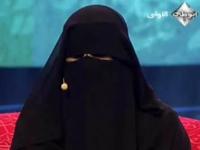BOB GARFIELD: Political protest in the Arab world can be risky, especially for a woman. But a Saudi Arabian housewife named Hissa Hilal has found an unlikely avenue for protest that might just make her rich.
[HISSA HILAL SPEAKING IN ARABIC/APPLAUSE] Hilal is one of five finalists on the Arabic poetry competition called The Million’s Poet. It’s kind of like American Idol, except for the poetry, and it’s the most popular reality show in the Persian Gulf. Hilal’s poetry, which she recites covered head to toe but for a slit revealing her eyes, condemns Islamic extremism and has earned her both death threats and the solid support of the show’s judges and of millions of text-messaging viewers. Hassan Hassan writes for the Abu-Dhabi-based newspaper The National, and he’s here to tell us what Hilal’s success represents. Hassan, welcome to the show.
HASSAN HASSAN: Thanks for having me.
BOB GARFIELD: First of all, I think it would be very difficult for American listeners to get their heads around the idea of a television show devoted to the recitation of poetry. Tell me where Bedouin poetry fits into the pop culture in the Gulf states.
HASSAN HASSAN: Everyone in the street would tell you their favorite lines of poetry. In Arabic we say culture is the oral history of all Arabs, a means to tell stories, to talk about social, political and religious issues. It’s for everyone.
BOB GARFIELD: Now, tell me about Hissa Hilal. Her poetry, from what I've read, criticizes various clerics who have issued what she regards as dangerous, unnecessary and extreme fatwas, especially those calling for the death of people who would put women and men in the same workplace and in the same educational institution. What has been the reaction to that kind of sentiment expressed on pan-Gulf TV?
HASSAN HASSAN: The poem has been very well received. If you talk about the people in the streets, the jury panel, everyone I've spoken with, they were really impressed with the poem. She comes across as very passionate about what she says. She considers the fatwas personal.
BOB GARFIELD: Now, you mention that she’s a Saudi. This is maybe the most conservative of the Gulf states, and women are covered pretty much head to toe. They can't drive. They are seldom in the workplace and are not necessarily welcomed as voices of political commentary, correct?
HASSAN HASSAN: Basically there is an extremist view among Islamists which says the voice of the woman is an awrah. “Awrah” is an Arabic word for the parts of the body that should be covered by clothing and should not be exposed to other people.
BOB GARFIELD: And there have been death threats to her and to her family. Tell me about the most extreme reactions to this episode.
HASSAN HASSAN: The death threats were issued, and it’s an online forum. Some member in that forum said, anyone has her address, so I can kill her? Another one was discussing what kind of death she deserves. She said she’s mostly concerned about her family. She has four children. But she said, I'm not concerned about myself. She said, I got scared at the beginning but I'm fine now.
BOB GARFIELD: Do you think that the support for Hilal is representative of public opinion in the Arab world in general?
HASSAN HASSAN: Absolutely. I think most people agree with her. She is part of a movement, especially young people, who refuse to listen to extremists. They believe they are detrimental to society. But the thing is, in her poem she criticized not only the people who issue these fatwas but the people who keep quiet when someone calls for violence and promotes terrorism. That was a main theme in her poem that many people didn't speak about.
BOB GARFIELD: You have just hit on the thought that has been a lot of western minds, going back about nine years, and that is -
HASSAN HASSAN: Mm-hmm -
BOB GARFIELD: - you know, why in 2010 do these sentiments expressed by one Saudi housewife on a reality show suddenly capture the imagination of the TV audience? Where have these expressions of anger been for the last nine years?
HASSAN HASSAN: The movement has always been there. It’s increasing because the extremism is increasing. They have powerful TV channels, and they talk all the time. People watch the TV and see these people, so they get angry. They say, these people don't represent me, these people say all these crazy things. And someone has to say, no, this is wrong. So Hissa is one of them. She said, I should stand up because I believe in peace. I think these people are evil and we should stand up against them.
BOB GARFIELD: When are the finals?
HASSAN HASSAN: Next Wednesday.
BOB GARFIELD: Since her broadside against the clerics, Hissa Hilal has done a few more poems. One of her most recent was on the theme of the media. What was her take?
HASSAN HASSAN: In the poem she said, “I join the birds of light in a battle of enlightenment. We want to rise with a world that is fighting its ignorance.” So she was talking about I'm part of a movement, I join the birds to defeat censorship because their goal is to cut the tongue of the truth.
BOB GARFIELD: To cut the tongue of the truth. Hassan, thank you so much.
HASSAN HASSAN: Thank you very much.
BOB GARFIELD: Hassan Hassan is a journalist with the English-language Abu-Dhabi daily The National.

